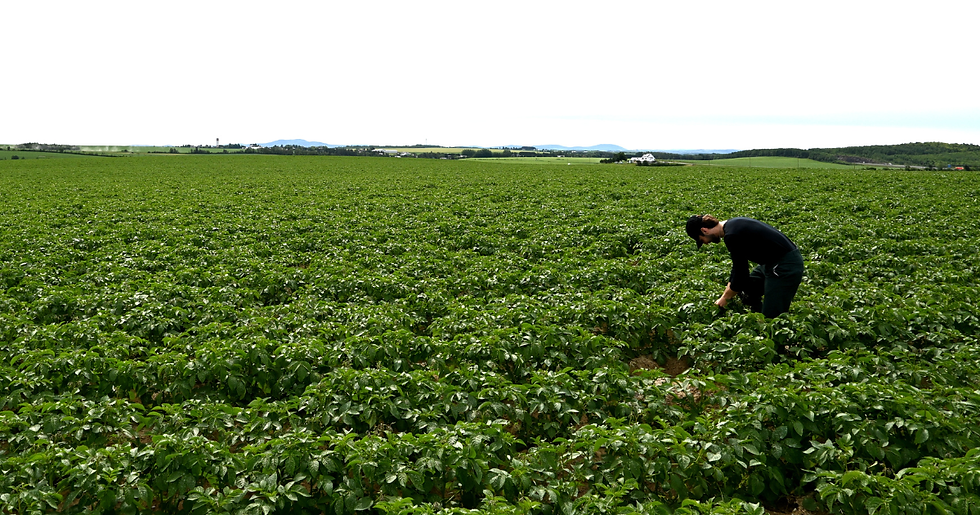How Technology is Revolutionizing Fertilizer Use for Sustainable Farming
- Alexa Campbell

- Oct 2, 2024
- 3 min read
Celebrating Global Fertilizer Day with Smarter, More Efficient Agriculture
Every year, Global Fertilizer Day on October 13th brings attention to the crucial role fertilizers play in feeding a growing world population. Modern agriculture relies heavily on fertilizers to improve crop yields, but with sustainability increasingly in focus, the industry is shifting towards smarter, more efficient use of these valuable resources. With rising challenges like environmental concerns and fluctuating prices, how can we ensure their sustainable and efficient use?

Fertilizers: Feeding the World
Did you know that about 50% of the world’s food production depends on synthetic nitrogen fertilizers? Without them, global food supplies would face significant shortages, putting billions at risk of hunger. Most fertilizers provide three key nutrients—nitrogen, phosphorus, and potassium—which are vital for crop growth.
Global consumption of fertilizers has reached over 190 million metric tons annually, with nitrogen leading the way. This high demand highlights the critical role fertilizers play in supporting farmers worldwide. Without them, yields would be far lower, leading to food shortages and higher prices.
Challenges Ahead: Rising Costs and Global Impacts
While fertilizers are essential, their misuse or over-application can have serious environmental consequences like water pollution, soil degradation, and greenhouse gas emissions. In fact, agricultural practices contribute to over 10% of total greenhouse gas emissions in the US. And unfortunately, it is estimated that approximately 30-50% of applied fertilizers are never absorbed by crops.
Recent years have seen fluctuations in fertilizer prices, driven by geopolitical tensions, natural gas prices, and shifting demand for key crops. Phosphate prices, in particular, have surged, making it more difficult for farmers to maintain profitability.
As we move forward, finding ways to balance affordability with sustainability will be crucial. This is where innovation in agriculture, like precision farming and nutrient management technologies, come into play.
Optimizing Fertilizer Use with Technology
Traditional methods of determining fertilizer needs often involve soil sampling and lab tests, which can be time-consuming and expensive. Moreover, they may not give a complete picture of the crop’s nutrient requirements throughout its various growth stages. This is especially true for fast-growing crops like potatoes and corn, which require constant monitoring to ensure they receive the correct amount of nutrients at the right time.
The future of fertilizer use lies in precision agriculture. Tools like the Picketa LENS (Leaf Evaluated Nutrient System) are helping farmers optimize how and when they apply fertilizers, ensuring nutrients are delivered where they are needed most. By using advanced spectrometry technology, the LENS scans plant leaves and provides real-time insights into nutrient levels. This data helps growers and agronomists make informed decisions about fertilizer application, tailoring the amount and type of nutrients to the specific needs of each crop and field.
This not only boosts crop yields but also significantly reduces nutrient waste, leading to more efficient fertilizer use and minimizing environmental impacts like nutrient runoff. By using the LENS, farmers can fine-tune their nutrient management strategy, ensuring crops get the right nutrients at the right time for optimal growth. In the face of rising fertilizer costs, this precision is key to maintaining both profitability and sustainability.

Excitingly, the Picketa LENS is part of the ongoing Soil Health Challenge with the IFAO and University of Guelph. The LENS is specifically being used to assess its potential to reduce fertilizer use while maintaining crop productivity. Be sure to follow us to get the latest updates on the results of how much fertilizer reduction is achieved!
The LENS benefits not just growers but also retail and input companies. By aligning incentives through transparent, immediate feedback, it helps solve agronomic challenges. This approach represents the next step in the evolution of agriculture, where collaboration and data-driven decisions empower everyone in the supply chain.
Conclusion
This Global Fertilizer Day, we encourage growers to explore the benefits of precision agriculture and smart fertilization strategies. By adopting new precision tools like the Picketa LENS, growers can contribute to a more sustainable and productive agricultural future. To learn more about how the Picketa LENS can help optimize your fertilizer use, visit our website at www.picketa.com. Or Email Picketa at info@picketa.com. For the latest company and industry news, sign up for the Picketa Field Notes Newsletter.





Comments